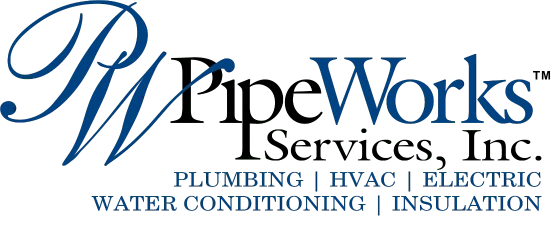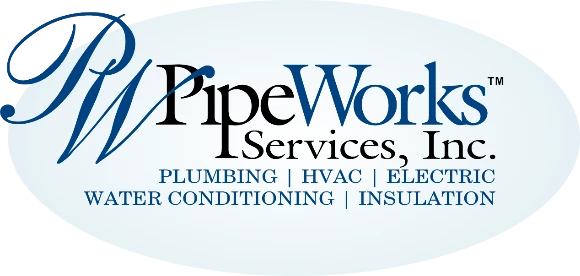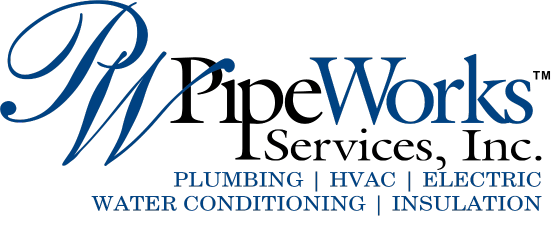Enjoy hot water with our water heater services in Chatham, NJ & Northern and Central NJ
 Pipe Works Services expertly replaces and repairs water heaters. As a family-owned company, we never use subcontractors—our in-house team ensures your installation is done right, with care and professionalism you can trust.
Pipe Works Services expertly replaces and repairs water heaters. As a family-owned company, we never use subcontractors—our in-house team ensures your installation is done right, with care and professionalism you can trust.
Whether you are looking to replace your old water heater with an energy-efficient model, or you need your current water heater repaired, you can rest assured that by choosing the experts at Pipe Works Services you are getting the most cost-effective solution for your home. We work on just about every type of water heater including electric, gas, tankless, heat pump water heaters, and hybrids!
Save money with our energy-efficient water heater replacement
Did you know that your water heater can account for an astounding 15% of your home’s total energy usage? Water heating is the second largest energy expense in a home.
If you have an old water heater, you could be paying hundreds of dollars more than necessary annually. It may be time for a water heater replacement. By taking advantage of new water heating technologies, you can reduce your monthly utility bill and stop worrying about running out of hot water or having your old water heater spring a leak. We are a home energy services company with the expertise to solve water heating problems in New Jersey.
Call or contact us online for a water heater inspection and estimate to discover whether repairing or replacing your water heater makes the most sense.
Energy Savings & Rebates for Water Heater Upgrades
Upgrading to a high-efficiency unit or switching to tankless/hybrid technology can lead to substantial savings. Many NJ homeowners qualify for utility rebates or federal tax credits when they install ENERGY STAR®-rated models. Ask us about current offers and how your new system can offset its own cost over time.
24/7 Emergency Water Heater Service & Maintenance Plans
Hot-water outages can happen anytime — especially during cold snaps. Our in-house technicians (no subcontractors) provide same-day priority service for homes throughout Northern & Central NJ. Plus, ask about our Advantage Program that covers installation, maintenance and repairs for one low monthly fee—so you stay worry-free.
Replace your old, tank-type water heater before it’s too late
If you have a tank-type water heater that’s more than 10 years old, wasting energy isn’t your only concern. Older tank-type water heaters corrode from the inside and eventually begin to seep water. Beneath a solid-looking exterior, the inner wall of an older tank can be badly corroded. If you’re lucky, you’ll notice a small leak in time to have a new water heater, such as a tankless water heater, installed. If not, extensive water damage is a possibility.
- Capacity: Choose a gallon capacity to accommodate the needs of your family.
- Recovery rate: Find out how fast heat is transferred to the water.
- Size: Be sure that the new water heater will fit in the space that you have. Consider installing a tankless water heater to save on space.
- Standby loss: Ask about the percentage of heat loss per hour from stored water.
- Cost: If your water heater is fairly new, it might be more cost-effective to have it repaired rather than replaced.
Water heater models available in NJ
If you want to learn more about how different water heaters work and what your options are when replacing an old water heater, we can help. The five different types of water heaters are listed below.
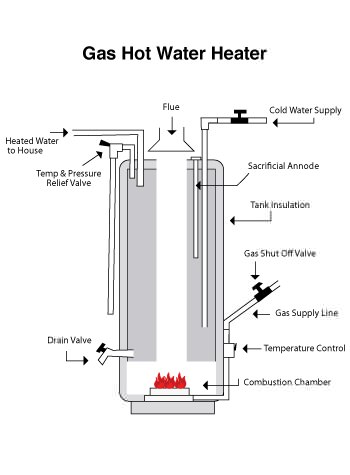
Tank-Type Water Heaters
A tank-type water heater (aka storage water heater) is the most common type of water heater used in the U.S., but not necessarily the best. Tank-type water heaters use electric resistance elements, gas or oil as the heat source. An electric tank-type water heater doesn’t have a burner or flue like gas and oil versions, and cost the most to operate. In fact, you can save up to $50 a month by getting rid of an electric water heater in favor of a more efficient one.
Tank-type water heaters come in different sizes. A 60-gal. or 80-gal tank is adequate for most households. New ENERGY STAR tank-type water heaters are insulated to improve energy efficiency by reducing standby heat loss.
Even with ample insulation, efficiency is limited because when the water in the tank eventually cools to a preset temperature, it must be reheated. Standby heat loss causes this cycle to repeat 24/7, whether you’re using hot water or not, and whether you’re at home or away. If your water heater feels warm to the touch, it’s losing more energy and costing more money than it should. When the burner shuts off, the heat in the water is released up the flue too – so exterior tank insulation can’t fix the problem of the water cooling again, requiring constant reheating. Interested in saving energy costs by eliminating standby heat loss? Then you may want to have a tankless or demand water heater installed.
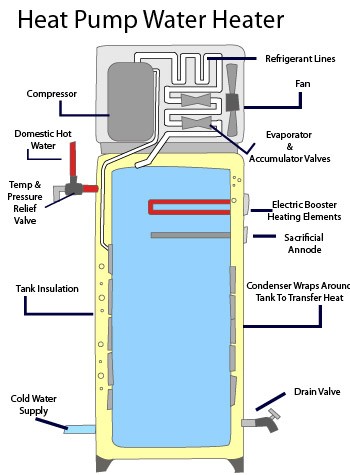
Heat Pump Water Heaters
A heat pump water heater also qualifies as a tank-type water heater, but it works in a different way. Instead of utilizing gas, oil or electric resistance as a heat source, this appliance gets its heat from a small air-source heat pump located on the top of the tank.
Like other heat pumps, this one uses a refrigerant to extract heat from the surrounding air and move it to a heat exchanger, where water heating takes place. If necessary, regular electric resistance heating elements in the tank can provide backup heating. A heat pump water heater is about twice as efficient as a standard electric water heater.
However, it will cool the space where it’s installed, so it may not be suitable for use in cold climates where basements and utility rooms need to be kept reasonably warm.
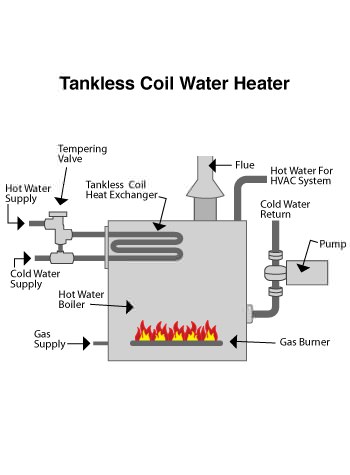
Indirect Water Heaters
An indirect water heater gets its heat indirectly, from the furnace, boiler or heat pump whose main job is to heat the home’s living space.
In an immersed coil installation, there will be a hot water tank that contains a coil-type heat exchanger that is “fed” by the furnace, boiler or heat pump. In a tankless coil installation, the water-heating coil is located inside the furnace or boiler, eliminating the need for a hot water storage tank.
An indirect water heater can be very efficient, especially during winter months when the furnace or boiler is running anyway. But it’s important to remember that the efficiency of this water heater is affected by the efficiency of the attached heating appliance.

Tankless Water Heaters
Tankless water heaters (aka demand water heaters) are becoming more and more popular because of how energy efficient they are. Unlike a tank-style heater that consumes energy heating and re-heating water, a tankless heater only heats water once, when a hot water tap is opened.
Standby heat loss is eliminated. Case studies have demonstrated that replacing an old tank-type water heater with a tankless model can cut water heating expenses by as much as 45%. Tankless heaters fueled by natural gas and propane are more efficient than electric models.
Tankless water heaters offer another advantage: They are very compact. A house-size model is about the size of a suitcase, and can be mounted on the wall. Most gas-fired models are direct-vent appliances, which means that they don’t require a chimney. Instead, exhaust gas is vented outside through a pipe that extends through the wall.
If you are interested in saving money on water heating by installing a tankless water heater, talk with Pipe Works Services, Inc. about this upgrade.
Contact us today to learn if a water heater upgrade is right for your New Jersey home
Call the experts at Pipe Works Services or contact us online to schedule a water heater replacement estimate in Chatham, Madison, Summit, Union, Short Hills, Basking Ridge, Florham Park, Millburn, Clifton, Somerset, NJ, and Northern and Central NJ. For a complete analysis of your home’s energy performance, schedule a home energy audit. Our custom audit will tell you which home energy improvements are right for your home, including water heater replacement and more.
